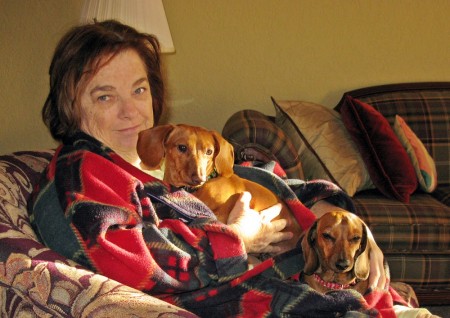This morning we took our dogs to the veterinary clinic at Davis-Monthan Air Force Base.* Schatzi goes in every January for a checkup and shots as required. We took Maxie too, so that both our girls will be on the same schedule from here on out.
Of course we’ve cared for Schatzi since she was brand new, and she’s in great health. We didn’t know much about Maxie’s medical history, though. She came to us wearing two Maricopa County tags dated 2009 and 2010, so we were sure she’d had a rabies shot as a puppy … but that’s about all we knew. In addition to ensuring Maxie is healthy and updating her shots, we wanted to get her on the same heartworm prevention medicine Shatzi takes, and of course she had to have a blood test first. So we got that done. We were also worried about her bad breath, fearing she had a rotten tooth or two.

What we learned about Maxie: as we thought, she’s 4 or 5 years old and has been neutered (as we thought also, but it’s a relief to have it confirmed). She has an implanted chip, which tells us her original owner cared. She doesn’t, thank goodness, have any bad teeth, just grungy ones with a little bit of gingivitis, so we’ll have to brush her teeth more often … we’ll also take her in for a cleaning as soon as the vet has an opening.
From the dogs’ perspective, the morning was a perfect storm of suck. Schatzi twigged to our destination as we drove through the main gate at the air base. She must have a gland somewhere, because the car immediately filled with the scent of fear, strong enough to nearly knock us both out. Maxie’s terror alert level went from blue to amber at the same time, and later, when the vet produced the needle with which to draw blood for the heartworm test, to red, with maximum yelpage. That in turn cranked Schatzi’s amp up to 11, and they had to put a muzzle on her to keep from being bitten … the poor kid was fighting for her life!
Both girls are resting now and are expected to live. What a couple of drama queens.
* Yes, military bases have veterinarians. Their primary mission is food safety: inspecting chow halls and the like. They also, naturally, take care of military working animals. If they have any time left over, they provide preventive medical care for servicemembers’ pets.